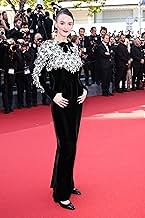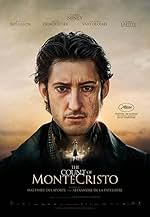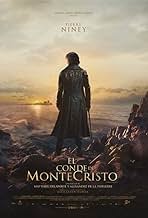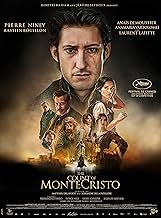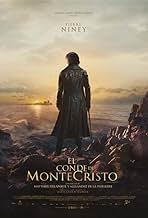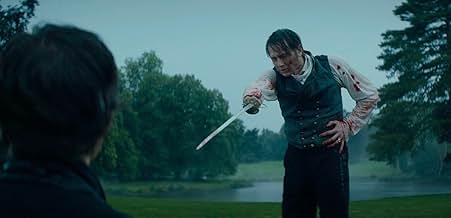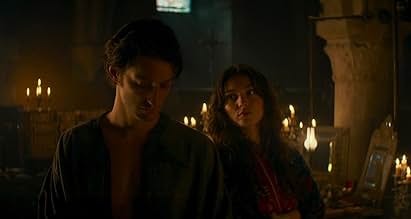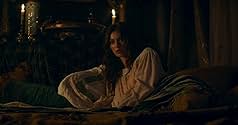Alvo de uma armadilha, Edmond Dantès é preso no dia do casamento por um crime que não cometeu. Após quatorze anos na prisão, ele consegue fugir. Agora rico, ele assume a identidade do Conde ... Ler tudoAlvo de uma armadilha, Edmond Dantès é preso no dia do casamento por um crime que não cometeu. Após quatorze anos na prisão, ele consegue fugir. Agora rico, ele assume a identidade do Conde de Monte Cristo e se vinga de seus traidores.Alvo de uma armadilha, Edmond Dantès é preso no dia do casamento por um crime que não cometeu. Após quatorze anos na prisão, ele consegue fugir. Agora rico, ele assume a identidade do Conde de Monte Cristo e se vinga de seus traidores.
- Direção
- Roteiristas
- Artistas
- Prêmios
- 6 vitórias e 18 indicações no total
- Gérard de Villefort
- (as Laurent Lafitte de la Comédie Française)
- Caderousse
- (as Stéphane Varupenne de la Comédie Française)
- Jacopo
- (as Abdé Maziane)
Resumo
Avaliações em destaque
The Count of Montecristo is another of those cases: those who read the book will be astounded by how the ending was completely distorted; and for no evident reason I'd submit, as the book's ending was dramatic enough.
So, again, if you didn't like it, why make a movie about it? If you want to ride your own ideas by all means do that, use your fantasy and in that case the sky will be the limit.
OK, end of runt...If I had to disconnect my literary memory and judge the movie for its sheer cinematographic merits, The Count of Montecristo is a honest cloak and dagger movie, with good performances by all the key actors, good photography and decent pace.
But then again, my literary memory kicks in again and a bittersweet aftertaste lingers in my mouth...
French cinema produces a lot of forgettable movies (in my opinion), a lot of fun ones, some greats and here and there a movie that actually makes me love cinema and the theater. Le comte de Monte-Cristo is of the latter.
Rarely do I find a movie that depicts love, friendship, treason, courage, solitude, caring, vengeance, and much more, in at least a decent manner. Nothing felt rush to me. The three hours were deserved and it felt like less than two.
I encourage you to watch this movie, it has many qualities and it won't be a waste of time.
Now if you are a Dumas enthusiast, you opinion will certainly differ.
I enjoyed the Richard Chamberlain TV movie, and the 2002 film despite some wholesale plot chopping in both. Even the 1998 6 hour 23 minute miniseries couldn't do the complete story and that's been my definite adaptation for the last 25 years.
The point being that to fit into 3 hours it was clear that some plot-lines were going to axed, characters changed and a streamlining of the narrative.
It then becomes a case of whether it was done in a way that allows those who don't already know the story, those who may have read the book three or four times, and all those in between to enjoy it.
Clearly the producers understood the underlying themes and (apart from one quibble I had which I'm not going to post as a spoiler) did great service to the original and still managed to include some sub-plots I thought they were going to cut out.
Of course, if you're a purist who hated Lord of the Rings because Peter Jackson changed characters and aspects from a 100% faithful adaptation of the book then you aren't going to like this either.
Totally entertained and it never once felt like a 3 hour film.
It also has a great soundtrack, the reprise of which had me stay for the whole credits.
Expectations did not come from an empty place, because many people read this fascinating tragedy of revenge and had hopes to see the development and deepening of the characters on a par with the original source. At the same time, the audience was offered a set of events that take place too quickly, as if on a high-speed cinema highway. Deep emotions, nuances of character, dramatic internal conflicts - all this was clearly not enough. But it is these details that make the work alive and truly memorable. Yes, undoubtedly, a thousand pages of a novel cannot be transferred into one film, but this is the power of creativity - the ability to revive images and give the viewer empathy. In the film, all this is there, but dosed, within the framework of the standard form of monosyllabic presentation.
The film is not bad, but spoiling Dumas means being completely incompetent, and, to my joy, I can't blame anyone for that. But I expected more and I'm a little disappointed. The whole film was shot with a 24 mm wide-angle lens, and it was unnecessary: there are clearly not enough close-ups, especially when the actors play well. Despite the decent acting, the characters seem to be unsaid and aimless, reduced to simplified and stripped-down images.
During the viewing, I hoped to see a philosophical reassessment or depth of thought in the scene with "Abbé Faria", but, unfortunately, only the Soviet painting by Georgy Jungwald-Khilkevich with Alexei Petrenko as the abbot was able to prepare the viewer, lay the foundation for the climax, making them realize the suffering of the prisoners and catch the main question: "What are you up to Will you spend your life, for revenge or for good?". After this episode, it became clear that the story would quickly sweep through the pages of the fireproof manuscript, and so it turned out.
The connection with the epoch and with the literary echoes of the past, which give the original its special flavor and indescribable integrity, has disappeared. Perhaps this is a sign of the times. Modern technology allows you to create impressive visual effects, but no technique can replace the power of a story, the ability to convey a mood and invite the viewer into a deep understanding of life. One thing is for sure: trying to adapt classics is always a challenge that requires incredible skill and understanding of the text. This is a difficult task, and, alas, not everyone can overcome this path, but the task was done well, although there was a residue of disappointment.
I asked myself what was the idea to make another version even though 18 exist already.
I watched it in French and realized that it is pretty far off the original storyline. Some characters are missing and others adapted. Apart from the great costumes and the brilliant locations, it seemed to me that only the beautiful, 'rich' sides were shown. The prison seemed too romanticised to me, as did the society. The Count could hardly stand out from the others due to his wealth and mystique, because this didn't always come to the surface.
Nevertheless, the film is entertaining and I was never bored. It managed to tell the whole story, although in a different way. Unfortunately, I couldn't answer the question of why this film was made, because it's just another version.
Watch the film if you don't know the story yet and like a romanticised story. Otherwise, I recommend the book by Alexandre Dumas and the film 'The Count of Monte Cristo 2002'.
Você sabia?
- CuriosidadesWith a budget estimated in EUR42.9 million, The Count of Monte Cristo is the most expensive French film of 2024.
- Erros de gravaçãoWhen Albert watches Hydee sing and play the guitar, it is very obvious that she is not even touching the strings half of the time.
- Citações
Danglars: The story makes no sense. We're swimming in madness. My boats were still in Marseilles yesterday. I will need a delay to pay you back. If...
Edmond Dantès: You have nothing left, Baron. Everything that was yours is now mine. The only thing you have left are these clothes. Leave Paris, and perhaps I will not let your wife and your daughter starve.
Danglars: But, Count, I...
Edmond Dantès: Do you find me brutal, Baron? "Not only do I know it, but I take pride in it." You should escort your wife home. She looks quite pale.
- ConexõesFeatured in La grande semaine: Episode #1.13 (2024)
Principais escolhas
- How long is The Count of Monte-Cristo?Fornecido pela Alexa
Detalhes
- Data de lançamento
- Países de origem
- Idiomas
- Também conhecido como
- El conde de Montecristo
- Locações de filme
- Empresas de produção
- Consulte mais créditos da empresa na IMDbPro
Bilheteria
- Orçamento
- € 42.900.000 (estimativa)
- Faturamento bruto nos EUA e Canadá
- US$ 529.830
- Fim de semana de estreia nos EUA e Canadá
- US$ 17.426
- 22 de dez. de 2024
- Faturamento bruto mundial
- US$ 78.679.746
- Tempo de duração
- 2 h 58 min(178 min)
- Cor
- Mixagem de som
- Proporção
- 2.35 : 1



